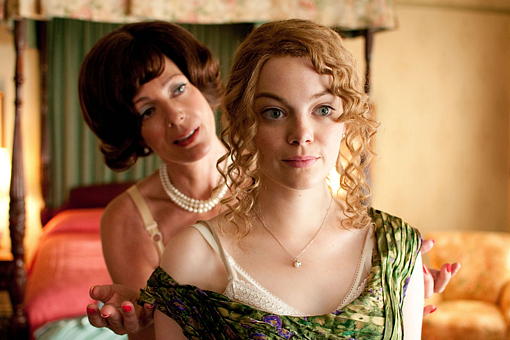By Pam Glazier · August 15, 2011

When I saw the preview for this film, it looked like one of “those” movies. You know, strong women dealing with harsh times while we all roll our eyes and nod, “yes, what an important message, I’m so glad I am being fortified with this vicarious historical strength.” I guess we’ll call ‘em medicine movies: Steel Magnolias, The Color Purple, Fried Green Tomatoes, Beaches, The Ya-Ya Sisterhood, A League of Their Own. Like I said, “those” movies. And whether or not you like “those” kinds of films, there’s no denying that they come with a strong dose of morality and a not-so-strong dose of exploding alien cowboys. And I suppose, begrudgingly, that The Help could also be relegated to the status of medicine movie, but to do so would be a disservice to the film and to you because it is so much more than that. It stretches further from this particular genre to bring out something real and connective that even us spine-ripping-ninja-fans can get into.
1960s Mississippi. Eugenia ‘Skeeter’ Phelan (Emma Stone) is back home after graduating university. She is excited to get her first big break in journalism—ghostwriting a housekeeping column for the local paper. Meanwhile, all the society girls have made it clear that the only important thing is to be married and proper. She realizes that she has no idea how to keep a house because that’s “coloreds work,” and so she decides to interview Aibileen Clark (Viola Davis…ahem Academy, ahem), the maid of one of her friends, in order to get cleaning tips for her column. Skeeter sees the daily injustices done to the maids by the proper white wives, and she is sick of it. She begs Aibileen to tell her stories so things can change. And this is the start of it all.
You see? Doesn’t it sound like one of “those” movies? Regardless, The Help is it crafted—honed even. First off, this is an ensemble piece, which is no easy task to pull off. So many characters, you can spot a shoddily-written ensemble a mile off. You feel it in your bones. There’s just this bland “not in the story” feeling where you’re busy trying to connect with all the underdeveloped characters within an obvious and predictable plot, or you find yourself trying to find the plot through the seeping morass of all the overdeveloped characters, or there are large chunks of story that are either missing or randomly pieced together. There are tons of ways to mess up an ensemble because ensemble pieces are so darned complex. But The Help as an ensemble was seamless. It was a strategically nuanced series of dovetails that brought everything together without calling attention to itself.
Overall, The Help completely enveloped me. I didn’t think about the fact that I was watching a medicine movie because within the first 15 minutes, I was no longer watching; I was feeling. And I’m no sugar-coated sentimentalist, but in this case my affection for the film was anything but mawkish. It was honest and real. I attribute a large part of this visceral connection to the casting of this film. And I know it’s weird to get all up into the casting angle, but there was such an interesting mix of light humor juxtaposed against some major heaviness that it deserves acknowledgement. I can’t claim that it was all in the casting or if the characters were just so well written that they jumped right off the page, but whatever it was, it worked, and it was delightfully fresh. I gotta get a hold of the screenplay to see how much brilliance I can glean from it. In any case, this is how it’s done—a perfect balance of humor and drama, of amusement and message, of ugliness and perseverance.
Of course, I’m sure I’ve not done this film justice with my clumping adoration. I’m not that talented. But go see it, honestly. It is so so so good.